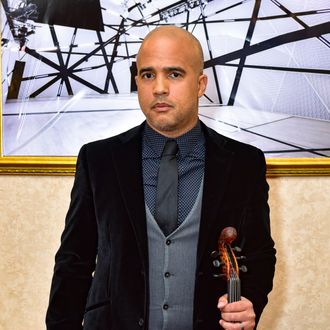
The Tulsa Opera hoped its “Greenwood Overcomes” concert wouldn’t just commemorate the centennial of the Tulsa race massacre — a tragedy that left hundreds of Black Americans dead — but also draw attention to living Black composers and singers, vastly underrepresented in the world of classical music. Instead, the program has gotten attention over the past week for what one composer tells Vulture was “the height of racist and discriminatory practice.” Daniel Roumain composed an aria titled They Still Want to Kill Us, one of four new pieces commissioned for the May 1 concert. Roumain, whose credits include the lauded 2017 opera We Shall Not Be Moved, wrote lyrics inspired by the details of the massacre, and ended with the lines, “God bless America / God damn America.” On March 19, he tweeted that the Opera “decommissioned” him over the phrase. “What’s so appalling,” he says now, is the echoes of the racist tragedy the concert aimed to draw attention toward.
The Opera responded to Roumain’s tweet with a statement on March 21, claiming the piece was cut after the singer set to perform it, Denyce Graves, voiced concern over the final lines. “I felt that they did not line up with my personal values,” she was quoted in the statement, which added that Roumain received full payment for the piece.
According to Tulsa Opera’s artistic director, Tobias Picker, and the concert’s co-curator, Howard Watkins, Graves told Roumain she “bristled” at the line in an email. Picker then replied to the email suggesting Roumain could instead repeat “God bless America” or change to “God help America.” While both the Opera and Roumain note that it’s common to suggest edits to commissioned pieces, Roumain says he took issue with Picker suggesting the edit as a white person. “Tobias Picker could have said, ‘I am going to decenter myself from this, and I trust the two Black professionals [Roumain and Graves] who have been engaged to come to a resolution,’” he says. Roumain was unable to speak with Graves personally about the piece afterward, he adds. Picker says Graves withdrew from singing the piece, and he forwarded her message to Roumain.
Picker tells Vulture it “is shocking” that Roumain saw a racial dynamic in the interaction. “I wasn’t stifling his voice, I was giving him a note,” he says. Watkins, who is Black and says he asked Picker to curate the program with him, tells Vulture, “It didn’t even occur to us that this would be interpreted as a race issue.” He calls it “reverse racist, and a bit offensive actually,” for Roumain to call out Picker, given that Picker is curating an event that uplifts Black composers.
Yet the Black Opera Alliance released a statement on March 25 saying it was “saddened and disturbed” by the Tulsa Opera deciding not to present They Still Want to Kill Us. The BOA went on to ask why the Opera did not reach out to other Black singers about the piece. Picker says he did, and the singers he reached out to were also uncomfortable with the line; Roumain says he was unaware of efforts to find a new singer. “This was an artistic disagreement,” Picker says. “It has been turned, by the BOA and Daniel, into something that it isn’t.”
Roumain hopes the Opera will work toward change in response to the incident. “Tulsa Opera could actually end up becoming a leader in the field,” he says. Roumain continues to reach out to Picker and Graves, he adds, and would like to have a “healthy, private, but fair conversation” over what happened. “That, really, is the way the story should end,” he says.
Meanwhile, the Tulsa Opera hopes to draw attention to the Black musicians its upcoming “Greenwood Overcomes” concert will spotlight, along with the historic tragedy it commemorates. The Opera has added a second performance, and will broadcast the concert over radio and livestream it. The Tulsa Race Massacre Centennial Commission, which is co-producing the event, echoed the desire to return focus to the history. “It is disappointing to see two Black artists, an organization, and a community pitted against each other and creating division surrounding a centennial commemoration focused on reconciliation and healing,” Phil Armstrong, the project director, tells Vulture in a statement supporting the Opera’s action.
Along with attending the concert to support friends who are involved, Roumain has also announced plans to develop They Still Want to Kill Us into a pocket opera and short film. He debuted a new website for the piece, where people can pay what they can to download the score, with a portion donated to support Black, Indigenous, and people of color opera artists. He’s heard from musicians across the world planning performances — even a woman in Tulsa planning to read the libretto and post a video on social media.
Through it all, Roumain says he wants “to lead with love.” “I love Tulsa Opera,” Roumain says. “I want them to succeed. That’s not the question. The question is, does Tulsa Opera still love me? And if they’re going to say that they can’t say the words ‘God damn America,’ well, what does ‘God bless America’ really mean for them?”


